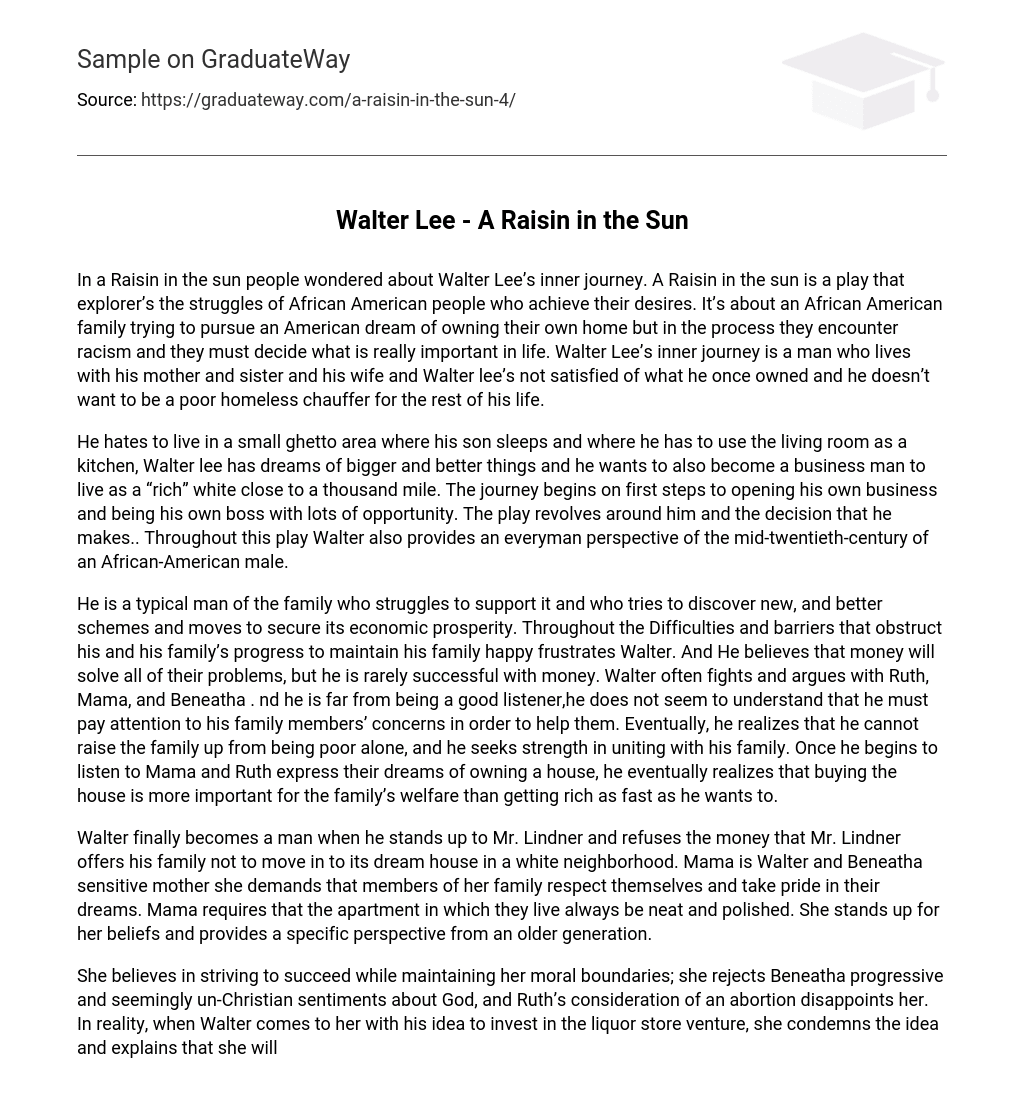The play A Raisin in the Sun explores the inner journey of Walter Lee, shedding light on the obstacles African American individuals face in their pursuit of their dreams. It revolves around an African American family’s struggle to achieve home ownership and confronts them with racism on their path toward fulfilling the American dream. Amidst these challenges, they must make tough choices that force them to question what truly holds value in life. Walter Lee, residing with his mother, sister, and wife, grows discontented with his present circumstances and rejects a life devoid of prosperity and stability as a chauffeur.
Walter Lee despises residing in a cramped neighborhood known as a ghetto, where both he and his son sleep and where he is compelled to utilize the living room as a makeshift kitchen. Walter aspires to a life of grandeur and envisions himself as a successful businessman, living in opulence similar to that of affluent white individuals who reside hundreds of miles away. The journey toward achieving his dreams commences with his initial steps in establishing his own business and assuming the role of an independent boss, which promises numerous opportunities. The play centers around Walter Lee and the consequential decisions he makes. Additionally, throughout the play, Walter offers a perspective representative of the average African-American male during the mid-twentieth century.
He is a typical man of the family who struggles to support it and attempts to discover new and better schemes and moves to secure its economic prosperity. Walter becomes frustrated throughout the difficulties and barriers that hinder his and his family’s progress, causing their happiness to be affected. Walter believes that money will solve all their problems but rarely succeeds with it. He often engages in fights and arguments with Ruth, Mama, and Beneatha, showing his inability to listen and understand the importance of paying attention to his family’s concerns. Eventually, he realizes that he cannot uplift the family alone from poverty and seeks strength in uniting with them. As he starts listening to Mama and Ruth expressing their dreams of owning a house, he gradually recognizes that buying the house is more crucial for the family’s well-being than achieving fast wealth.
When Walter confronts Mr. Lindner and declines his monetary proposition to prevent his family from moving into their ideal home in a white community, he finally embraces adulthood. Mama, being a caring and perceptive mother to Walter and Beneatha, insists on self-respect and aspiring for one’s goals within the family. Mama maintains a tidy and immaculate apartment, expecting the same level of discipline from her loved ones. Advocating for her values, she shares a unique viewpoint rooted in an older generation.
She believes in striving to succeed while staying true to her morals. She disagrees with Beneatha’s progressive and seemingly un-Christian views on God, and she is disappointed by Ruth’s consideration of an abortion. In reality, when Walter suggests investing in the liquor store business, she rejects the idea and states that she cannot support it due to its un-Christian nature. For Mama, money is simply a tool to achieve her dreams. She values dreams more than material wealth, and her dream is to own a house with a garden and yard where her grandson Travis can play.
The most nurturing character in the play is Mama, who consistently reminds Walter that her sole desire is to make her children happy and provide for them. She deeply cares for Walter and proves it by giving him the remaining insurance money. Furthermore, she shows deep concern for Ruth, offering comfort when Walter neglects her. Mama also demonstrates respect for Beneatha’s opinion of George Murchison, advising her daughter not to waste time with such a “fool.” Mama’s love extends to her grandchild, Travis, as she hopes their new house will have a spacious yard for him to play in. In a different manner, Mama also has affection for her plant, which she diligently nurtures throughout the play as it brings her solace. On the other hand, Walter Lee feels conflicted about accepting the money because he believes it compromises his pride and dignity. Additionally, he believes that certain things can never be purchased. Ultimately, his decision is motivated by his son.
The next topic in Raisin in the Sun involves comparing Langston Hughes’ poem with the play. Raisin in the Sun primarily focuses on the dreams of each character and their struggles with various issues and circumstances in their lives. The title of the play itself aligns with the poem by Langston Hughes, which explores dreams that have been neglected or abandoned.
Everyone in “Raisin in the sun” has their own individual aspirations that they hope to achieve someday. For instance, Beneatha wishes to become a doctor, while her husband Walter desperately craves financial stability to provide for his family. However, due to the challenges they face, fulfilling these dreams becomes increasingly difficult. At the conclusion of the play, these characters share a common desire to obtain a house, which is a dream they greatly yearn for and desperately want to come true. This is because it would restore unity within their family.
In comparison to Langston Hughes’ poems, the play also explores the theme of dreams being put on hold. Similar to Hughes, the play illustrates how dreams can gradually diminish and never be realized. In the words of Hughes, dreams are like a “tree of life” (Langston Hughes p. 12). Through the character of Walter, we witness the consequences of neglecting one’s dreams, as things spiral out of his control and become overwhelming.





